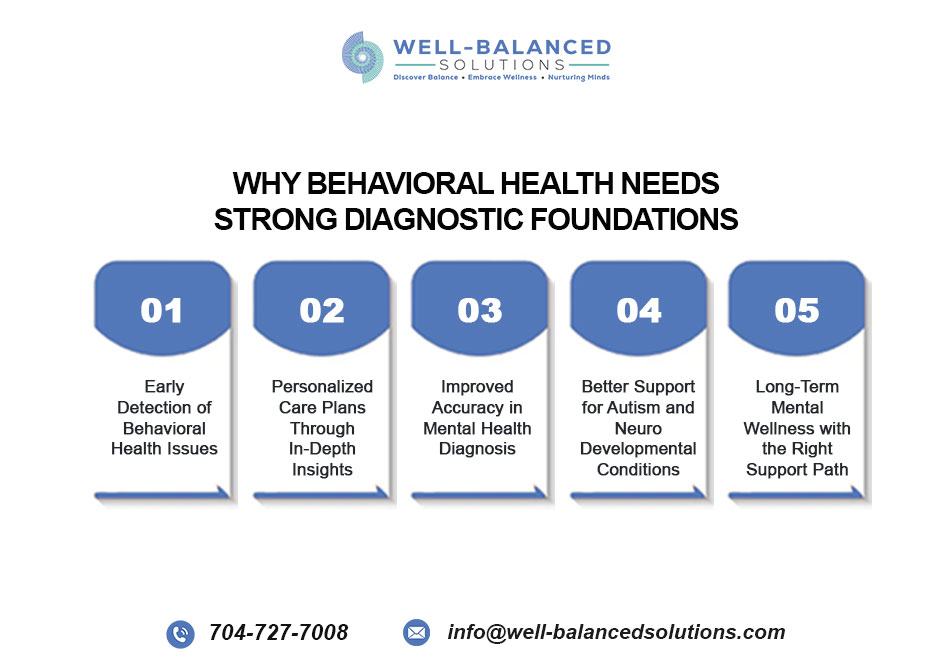Doctors use special check-ups to help people with mind and feeling problems. These are called comprehensive diagnostic evaluations. They help find out what is wrong. First, these check-ups give the right name to problems. When doctors know what is wrong, they can make a good plan to help. Moreover, this saves time and money on wrong treatments.
Next, the diagnostic evaluation process looks at the whole person. It checks how you think, feel, and act. Additionally, it looks at your life at home and school. Then, families learn more about why someone acts in certain ways. This knowledge helps everyone understand better. Consequently, people can be more patient and kind.
Finally, what is comprehensive diagnostic evaluation? It is like a road map for getting better. It shows the way to the right help. Therefore, people can live happier, healthier lives with the right support.
Why Behavioral Health Needs Strong Diagnostic Foundations
Doctors need good tools to help sick people. A diagnostic tool helps find what is wrong with someone. Many children and adults have feelings they do not understand. First, we must know what is wrong to make it better. Screening and diagnostic tools can spot problems early. These simple tests help doctors see the real issue.

Moreover, the right test means the right help can start fast. Finding problems early leads to better healing. Additionally, good tools save time and money for everyone. Families feel better when they know what is happening. Therefore, strong testing makes healing paths clear and helpful for all.
1. Early Detection of Behavioral Health Issues
Spotting signs of mental health problems early helps kids get better faster. Little ones sometimes feel sad and worried too just like grown-ups. The first signs might be changes in how they sleep and eat. Many doctors now use simple screening tools during check-ups. These tools help find problems before they get bigger.
Also, teachers can notice when a child acts differently in class. Sometimes, children show their feelings through drawing or play. Moreover, parents know their kids best and can see changes first. Parents should talk with kids in easy words about feelings. Furthermore, special tests can help doctors find out what’s happening.
2. Personalized Care Plans Through In-Depth Insights
Doctors make special plans just for you. First, they use a diagnostic tool to learn about your health. This helps them understand what you need. Next, the diagnostic evaluation process begins with simple questions. Your doctor listens to all your concerns. They check everything carefully.
Moreover, a comprehensive diagnostic evaluation looks at your whole body. This is not a quick check-up. It takes time to get it right. Finally, your care plan will match only your needs. Everyone gets different help because we are all special. Your health matters a lot!
3. Improved Accuracy in Mental Health Diagnosis
Doctors now find health problems in the mind better than before. New screening tools help spot signs early. First, they ask simple questions to check their feelings. Then, special diagnostic tools look deeper at how someone thinks and feels. Moreover, these tools work for kids and grown-ups too.
A comprehensive diagnostic evaluation takes time but gives clear answers. Also, doctors can now tell the difference between sad feelings and bigger problems. Better tools mean better help for people who feel bad inside. Finally, early finding of problems helps people get better faster with the right care.
4. Better Support for Autism and Neurodevelopmental Conditions
Kids with autism need help early on. Early testing can make a massive difference in their lives. Parents should watch for symptoms that their child may need help. Doctors use special tools to check if a child has autism. These screening tools help spot signs when kids are very young.
Moreover, these tools look at how kids talk, play, and act with others. A comprehensive diagnostic evaluation for autism gives a clear and full picture of the child’s needs.
5. Long-Term Mental Wellness with the Right Support Path
Finding good help for your mind is important. First, you want a comprehensive diagnostic evaluation to know what is going on. During this check-up, doctors ask questions and listen to your worries. Next, the diagnostic evaluation process helps find the right kind of help for you. This way, you can feel better faster.
Also, talking to a kind helper can make sad feelings go away. Many people feel joyful after getting the right support. Furthermore, taking small steps every day helps keep your mind strong. Remember, it’s okay to seek help when you need it. Finally, with a good guide, you can enjoy life more and stress less.
Why Choose WBS (Well-Balanced Mental) for Diagnostic Evaluations?
WBS helps find what makes your mind hurt. Their diagnostic services are done by kind experts who listen. First, they ask easy questions to learn about you. Then, they make a plan just for your needs.
Moreover, WBS tests are quick and not scary at all. Many kids feel happy after visiting the nice doctors there. Also, parents get clear answers about how to help their child. The mental health evaluation at WBS is the best in town.
Finally, they give tips you can use at home too. WBS cares about making kids feel good again. Book an appointment with WBS to create your personalized stress-relief plan!
Conclusion
A comprehensive diagnostic evaluation helps people understand their mental health better. It uses the right tools to find the real problem. This process is clear, safe, and very helpful. It can find early signs of issues like autism. It also helps doctors give the right care.
With the right diagnosis, people get the support they need. This leads to better mental health over time. If you want strong and clear answers, a full evaluation is the first step. Choose a trusted place like WBS Mental Wellness to begin your journey toward healing and support.
FAQS
Q. What distinguishes a comprehensive diagnostic evaluation from standard mental health screenings?
A full check-up looks deeper than quick tests. It takes more time, asks many questions, and checks your whole history. The doctor learns more about all your problems.
Q. How does the diagnostic evaluation process enhance the accuracy of mental health diagnoses?
The full check-up process helps doctors get things right. They look at many parts of your life, not just a few signs. This way, they find the true problem.
Q. What are the key components of a comprehensive diagnostic evaluation for autism?
A good autism check-up watches how you play and talk. It also asks parents questions. Doctors check thinking skills and how you act with others.
Q. When should one consider undergoing a comprehensive diagnostic evaluation for behavioral health concerns?
Get a full check-up when sad or angry feelings stay too long. Also, if school or work gets hard, and if family says you act differently.
Q. What types of diagnostic tools are commonly used in behavioral health assessments?
Doctors use talk tests, paper tests, and watching how you act. They may ask family questions too. Some tests check how your brain works.
Resources
CDC – Developmental Monitoring and Screening
NIMH – Children and Mental Health







